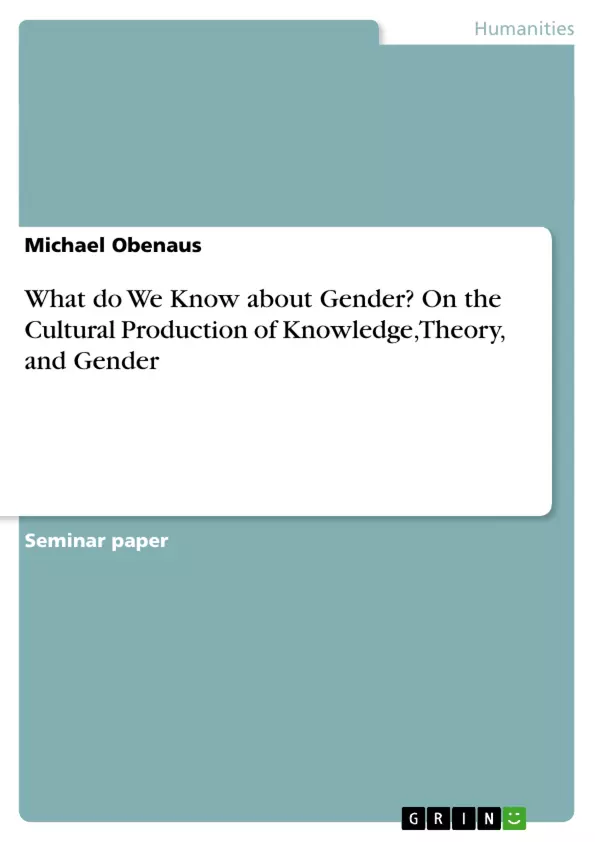We are born as either boys or girls, and we will be men or women. Even those who are “sexually different” are still classified male or female. There is no neither-nor, there is no both, there is no in-between. We grow into the world around us and, as we grow older, we begin to understand reality. We have knowledge of the world and we can work with that knowledge: We know what is true, real, just. We can also speak about abstract concepts, such as feelings, politics, history, and we understand each other, we know what we mean. We categorise the world according to natural, obvious criteria into discrete kinds. For instance, we are either men or women.
This essay is an attempt at tackling most of the above assumptions. All of our thinking - whether abstract or concrete - will be regarded as based on interacting cognitive, social and cultural systems, such as perception, categorisation, language, belief, etc. There are no social/ cultural aspects independent of general cognitive structures, and cognitive processes are in turn influenced by social/ cultural patterns. For most of us, this sounds intuitively dubious: Do we not perceive the world all in the same way? Are there not universal similarities in basic categories and in sensual perception? Can we, for instance, claim a cultural influence on our visual or acoustic perception?
Recent research in Cognitive Sciences 1 (e.g., psychology, psycholinguistics, language philosophy, etc.) has suggested that we may have to assume something in that direction. Categories, for instance colours, are categorised differently in different cultures. Not that items in the world actually do “look different” (in terms of properties of reflection, wave lengths of light, etc.), but culture-specific categorisations depend on the specific kinds of bodily and social interactions within a given culture. Obvio usly, these experiences and interactions differ between cultures, to a larger or lesser extent. These culture-specific kinds of interactions with “the world” form part of the basis for language codes, cognitive processes, social interaction patterns, concepts, beliefs, emotions, etc. I will take these assumptions as the starting point and as the basis of my argument. [...]
Inhaltsverzeichnis (Table of Contents)
- Introduction
- part one: KNOWLEDGE
- 1. A 'Folk Theory' of Knowledge
- The Objectivist Paradigm
- Basic Cultural Conceptualisations
- 2. Knowledge as a Cultural Product
- The "Nature" of Knowledge
- Processes of the Production of Knowledge
- 3. Summary: What Has That Got to Do with Theory?
- Scientific Knowledge
- Subjectivity, and the Dream of the Individual
- Conclusion and Outlook
- References
- part two: GENDER
- 4. Theorising SEX and GENDER
- SEX and GENDER
- The Heterosexual Norm
- Identities - Transgressions - Subversions?
- 5. Discussion: Priscilla, Queen of the Desert
- GENDER (Re-) Produced
- Cultural Context (Contested)
- Subversive Representations?!
- Final Remarks
- References
Frequently Asked Questions
How is knowledge considered a cultural product?
Knowledge is not just a collection of objective facts but is produced through interacting cognitive, social, and cultural systems. Our perception and categorization of the world are influenced by the specific language, beliefs, and social patterns of our culture.
What is the difference between Sex and Gender in theory?
Theoretical frameworks often distinguish between 'sex' as biological attributes and 'gender' as the social and cultural roles assigned to individuals. This essay explores how these categories are constructed and maintained by societal norms.
What is the "Objectivist Paradigm" in knowledge theory?
The objectivist paradigm assumes that there is a single, objective reality that we all perceive in the same way. The essay challenges this by suggesting that cultural interactions shape our cognitive processes and how we categorize reality.
How does the film "Priscilla, Queen of the Desert" relate to gender theory?
The film is used as a case study to discuss gender (re-)production, subversive representations, and how cultural contexts contest or reinforce traditional gender norms and the heterosexual norm.
Do all cultures categorize basic concepts like colors in the same way?
Research in Cognitive Sciences suggests that while physical properties like light wavelengths are universal, different cultures categorize colors differently based on their specific social and bodily interactions with the world.
- Citation du texte
- Michael Obenaus (Auteur), 2000, What do We Know about Gender? On the Cultural Production of Knowledge, Theory, and Gender, Munich, GRIN Verlag, https://www.grin.com/document/23527



